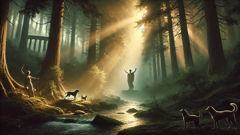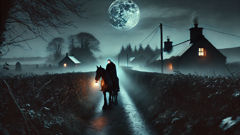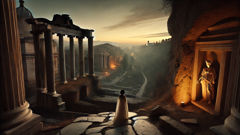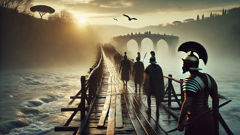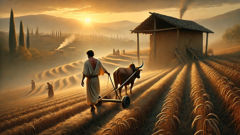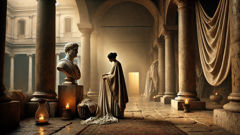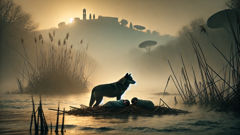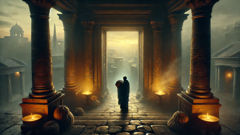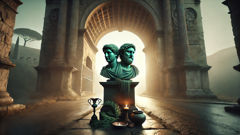Introduction
On the sun-struck flanks of Arcadia, where limestone bones the hills and cedar scents the wind, there lived a young hunter named Actaeon. His name arrived at the lips of neighbors like a small prophecy: a son carved from the urgency of chase and the patience of silence. He learned to read the land the way other children learned letters—every scrape on a rock, every fresh hoof-print in the clay, every bird's alarm a sentence in a language he alone could translate. Herdsmen offered him bread and songs, and the old women of the village whispered that he was favored by fortune; his hands were quick, his aim precise, and his pack of hounds answered to him as if he were some lesser god. Yet Actaeon was not merely a man of craft; he loved the forest with a tenderness that bordered on devotion. He moved through dells and ravines not as an intruder but as a familiar, as if the trees remembered him and the streams inclined themselves to his passing. The hunters of the countryside watched him with equal parts admiration and unease, for there was something about his kind of knowing that made them feel seen. In the clear hours of morning he would stand at the crest of some ridge and, with the world laid out before him like a map of possibility, imagine the traces of life—elusive boar, red deer, the glint of a summer stag—and plan his days accordingly. Word of Actaeon's skill reached farther than he expected. Pilgrims, merchants, even elders from distant villages murmured of the boy who moved like a shadow yet carried a laughter that brightened the deepest glen. But a life carved out by appetite and excellence stirs a particular tension in the cosmos. For in a world where gods walked the margins and fate braided itself through small acts, knowing the land too well could draw attention. It was the kind of attention that did not knock; it moved in and rearranged the furniture of a life without asking for permission.
The Hunter and the Hounds
Actaeon grew in the world as if sprung from the wild itself—muscles tempered by swift footfall and eyes that held the exacting patience of a watcher. From morning fog to the peach-warm dusk he walked and listened. The hounds that ran at his heels were chosen by instinct and trained by his voice; their ears learned to read timing and danger, their paws to trace the faintest scents. They were his household, his ritual, the living counterpoint to his solitude. Each dog carried a name like a small vow. Brindle had the habit of stepping just beyond a scent and waiting for Actaeon's hand; Phalanx moved as shadow to his left, and ivory-muzzled Linos was the soft cultivator of peace after a day of chase. People who saw them together sometimes imagined they made a single organism—Actaeon the pulse and the pack the blood—moving with a purpose older than the roads. He learned from them as much as they learned from him: a sudden ricochet of birds meant a fox, a half-torn reed meant a hidden spring. In the oldest lore, hunters keep an understanding with the land: to take for necessity, to leave traces that are also gifts. Actaeon kept this rule mostly; he honored breeding seasons and old mothers, and he left offerings of grain on the altars to the nymphs and at the roadside stones. Still, there was an edge to him. Not greed, strictly, but a hunger that collected into a tight, unspoken pride. Perhaps it came from the way the villagers rose to tell his exploits, or from the easy laughter that followed his success, but it became part of his frame. He began to catalogue his days as one might catalogue a succession of trophies—each successful hunt proclaimed, each failure preserved as grit to future triumphs. In time, stories grew into a small halo around his head. Boys followed him from a distance to steal a glimpse of techniques they would not yet dare try. Old men compared him to the hunters of their youth, and women spoke of him at loom and hearth as if his prowess made the nights warmer and safer. The wild, however, is not a stage for self-congratulation forever. There are margins and thresholds that are marked by softer lines than law and harder consequences than gossip. One such place in Actaeon's world was a hidden glade, a fold in the land where water pooled in crystal bowls and the trees leaned down to listen. It was a place of hush and removed light, a pocket of the country where the gods themselves were said to pass and sometimes linger. Villagers called it the goddess's hollow, and though many swore they had never seen a deity there, offerings occasionally appeared—strip of wool, cluster of figs, a smear of olive oil on a low stone. Actaeon heard those tales and felt, bewilderingly, a desire to measure himself against place. The glade meant more than a prize; it was an invitation to an intimacy the hunter had cultivated with the broader world. He began to plan for the day he would see the hollow alone and understand it the way he understood other things, with the certainty of someone who had interpreted every leaf and stream. On a morning when mist lay like sleeping cloth over hill and hollow, when the air tasted of rain that had not yet fallen, Actaeon moved toward that fold. He walked silent, as all true hunters do, not because he wished to hide but because silence itself is a thing that allows the land to speak. The hounds spread like dark punctuation behind him, noses to the ground, every step a chorus of restrained urgency. As dawn eased into a gold that filled even the low reaches, the hunter came upon the hollow and found, with the immediate, incongruous clarity of fate, that the stories had been true. No longer a rumor in the mouths of old women, the hollow was inhabited in the present tense. Women—luminous as statuary and immediate as breath—moved through the water. Their limbs were wet and gleamed; droplets hung like small planets in the low, blue light. Among them was Artemis, and she was not a rumor either. She moved with the authority of tide and storm, young and eternal all at once, a figure of silver and not-silver, of an ancient beauty that did not ask for the world’s consent. Actaeon, despite the care with which he had learned to step and listen, stood where he was. The world that had taught him to translate air and animal for a stunned instant failed him; he became merely a man caught in the rawness of seeing what he was not meant to behold. There is a peculiar violence in a glance that delivers truth without time to prepare. He saw Artemis raise her hand, the curve of her shoulder, the line of her neck, and the way the water plunged like glass around her calves. For a moment—a dangerous human moment—he felt small in the way one feels when confronted with a clear and personal revelation. To be in the presence of the divine is to experience an exposure that the human body was not meant to endure. Actaeon’s throat tightened as if pulled by a string; the hounds, sensing his sudden stillness, tried to read the change and then read wrong. In that slender second between perception and reaction, the fate of his life folded into itself with the crispness of a snapped branch.
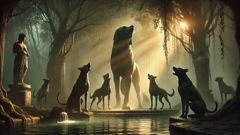
The Transformation and the Hunt
There are moments in myth that split a life from its soil and set it adrift in story. Actaeon’s transformation is such a moment. When Artemis turned her head and met his eyes, the air itself seemed to curdle. She was not slow in her justice; the gods of that age measured offense not by intention but by the fracture it made in the honor due to them. Some say she spoke a name like a blade; others say she breathed a single syllable and the syllable did all the work. Whatever the sound, it arranged the world anew. Actaeon felt the first uncanny tug at the edges of himself, a confusion that began in the marrow and moved outward. His arms reframed themselves into new articulations. Skin tightened and sprouted the sharp, bewildering cold of hair. The smell of pine and river changed around him; his mouth filled with a different set of urgencies—bark, panic, a quick calculus of escape that no longer knew human words. He staggered and tried to call, to speak to the hounds that had been his family, and instead a hoarse, reedy sound issued from him, the low currency of the stag. The metamorphosis was not merely physical but interpretive: the world that had listened to him for years recalibrated and now looked at him and knew only prey. His hands, which had once fastened a leash and offered a soft palm to a dog’s head, became hooves that struck stone and slid. His voice, which had commanded and soothed, became a foreigning cry that set the hounds’ instincts alight. He watched himself from the thinned place between recognition and loss; he watched the faces of his dogs, who had loved and obeyed him, fold into the bright hunger their training had always prepared them to obey. There are myths that bend for pity and scatter mercy like seed. This was not one of those myths. Artemis’ gaze did not soften. If there was cruelty, it was precise, and if there was sorrow, it lay like a subtle thread beneath what she did: the goddess enforced the distance that must remain between human curiosity and her private rites. The hounds—trained to track scent and not to identify the human soul behind it—took their cue in the worst possible way. What moments exist for response are measured in the heartbeats between an injury and its echo; Actaeon had none. The pack surged because scent commanded them, and scent told a hunter-hound story older than human law. Phalanx was first, teeth bright as thought; Brindle followed with an ardor that had always been twin to Actaeon’s own. In the instant of the charge, memory and present folded together for the condemned man who now ran on four trembling limbs. He tried, in some last human calculus, to leap a low bank, to use the land, which had been his ally, as sanctuary. But the world had shifted its loyalties; the trees that had once whispered to him now bowed their branches in an indifferent wind. The hounds tore into him with a kind of formal inevitability. Flesh was not where the story paused—the real pain was the recognition in those eyes that had once looked back to him for command and for comfort. The animals did what animals do when their training and their nature align; they did not know that they were renditions of a man who had fed them, warmed them, called them by name. In the myth as it was told and retold, the death is savage and the grief profound. The sound of it rippled through the hollow and into the village beyond. Women at loom lifted their faces from cloth and felt a coldness pass like wind. Men packing away their nets and tools stopped, the line of their mouths hardening into understanding before words formed. When the pack returned, it carried only the gestures of their former master: tattered ribbons of his cloak, a smear of blood on bark, a single handless glove snagged on a bent twig. The hounds arrived panting and bewildered, their muzzles stained and their eyes queer with the absence of the voice they had followed. The village elders convened; rites were performed; offerings piled at the edges of the glade like unread letters. Families of hunters spoke in low tones about hubris and borders, about the unmeasured curiosity that calls up the gods' retribution. Yet even among chastisement there lingered the spare ache of pity. For some, Actaeon’s fate was a lesson: do not look upon the gods. For others, it was a refracted sorrow: a man who loved too much and took for that love a debt no one could repay. Over time the story gained edges and color. Poets pressed it into neat morals, painters staged its dramatic collapse, and the hollow became a place of both fear and pilgrimage. Pilgrims left small tokens—pieces of braid, coins, a smear of oil on the stones—an odd mix of devotion and lament. Shepherds moved their herds away from the place when summer ran long, lest the old currents of the earth remember and do again what they had done. Yet there was an afterlife to the pain that no one could scorch away. Actaeon’s transformation entered the language as a metaphor for the costs of sight—seeing what one is not meant to see and losing all that follows. Mothers used the story to bend their children from reckless curiosity; lovers used it to speak of the brittle border between intimacy and trespass. Even those who argued that the goddess had been too severe murmured about the fragile line that runs between reverence and ownership. The hollow, for all its terror, remained a place where the living felt both the nearness of divinity and the cold truth of consequence. At night, when the wind came down the slopes and the laurel leaves clicked like small cymbals, some villagers said they heard, in the far reed beds, a faint cry that was neither human nor wholly animal. It might have been memory, or the wind, or the unquiet layering of a story that refuses to rest in a single tongue. Yet the sound kept the myth alive, as myths do: not as documentation but as living warning and remnant of a grief that refused to finish itself tidy and small.
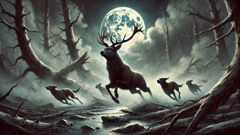
Conclusion
The tale of Actaeon endures because it binds so many truths into one tight knot: the unsteady human hunger to know, the fragile boundary between intimacy and violation, and the quiet ferocity of the natural world when its rituals are violated. It is a story that resists comfortable endings. There is no tidy revenge that balances the ledger; instead, there is the slow work of memory and the way a place keeps its history folded into rock and root. Poets will always write of Actaeon as a figure of caution, as a man who learned too late that some sights demand a price. Yet there is another reading that lingers in the hollow of the myth—one that sees not only punishment but the tragedy of a life so deeply entangled with wildness that when it changes, everything that loved it follows, unaware. Today, when hikers pass the slopes of Arcadia, when artists paint the subject and scholars argue over nuance, the core image remains: a man and his hounds, a goddess at the water, and the brief, irrevocable instant that braided their fates together. In that instant there is a lesson that sits at the edge of grief and wisdom: we move through a world that is older and stranger than any single human appetite, and the reverence we owe it is as necessary as air. To tell Actaeon’s story is to keep that reverence alive, fragile though it is, in the mouths of those who still listen.

